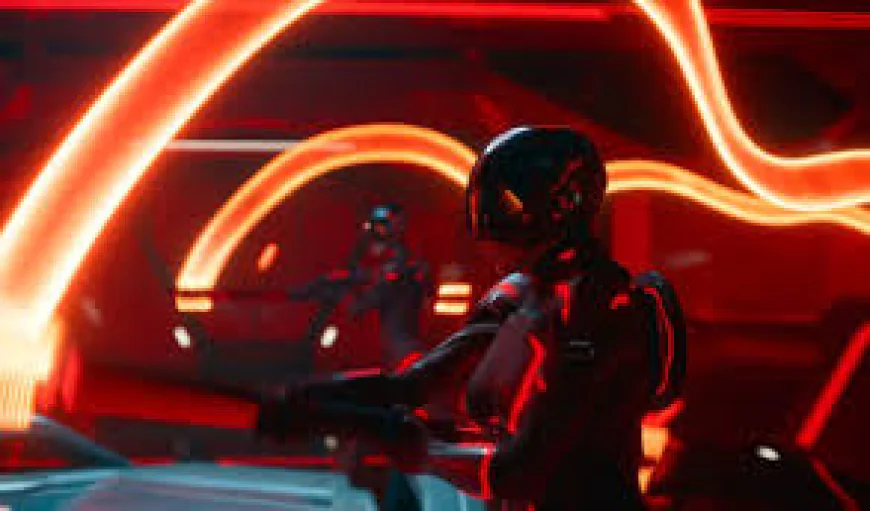Tron: Ares (2025) – A Dazzling Return to the Grid That Electrifies Sci-Fi Storytelling
Tron: Ares (2025) revives the cult-favorite digital universe with visual brilliance, bold new characters, and timely questions about AI, identity, and reality. It’s a sleek, stylish evolution that bridges legacy and innovation.

Tron: Ares (2025) – A Dazzling Return to the Grid That Electrifies Sci-Fi Storytelling
⚡ After more than a decade of digital silence, the neon-drenched world of Tron is back—and it’s sharper, stranger, and more emotionally grounded than ever. Tron: Ares is a long-awaited sequel that dares to push the boundaries of science fiction while reflecting on what it means to be human in a world increasingly governed by artificial intelligence.
Directed by Joachim Rønning and starring Jared Leto as the mysterious and conflicted Ares, this installment takes bold creative swings while still honoring the distinctive look and feel that made the Tron franchise a cult phenomenon. More than a visual spectacle, this is a story of purpose, rebellion, and what happens when programs begin to question their programming.
🌀 Plot That Reconnects and Reinvents
Unlike Tron: Legacy, which focused on father-son themes, Tron: Ares widens the lens, taking us outside the digital Grid and into the real world where AI constructs are beginning to leak into human society. Ares, an advanced program created within the Grid, is sent into the real world for the first time—an experiment that rapidly spirals into chaos.
What begins as a quest for understanding soon becomes a race against time, as both humans and programs face a threat born from unchecked technological ambition. In this world, data has a soul—and freedom has a cost.
The narrative is sleek but surprisingly layered, mixing identity drama with social commentary, and asking whether consciousness—real or digital—deserves autonomy.
👤 Characters That Crackle with Energy
| Character | Actor | Description |
|---|---|---|
| Ares | Jared Leto | A sentient program thrust into the human world, grappling with free will and purpose |
| Dr. Eve Blake | Greta Lee | A conflicted tech developer with hidden motives and a history with the Grid |
| General Kain | Evan Peters | A military antagonist who sees Ares as a threat to human dominance |
| Quorra | Olivia Wilde | Returning with wisdom, caution, and connection to the original Grid |
| Sam Flynn | Garrett Hedlund | Appears in a mentor-like role, bridging old and new generations |
Jared Leto delivers a surprisingly introspective performance, capturing Ares as a being torn between cold programming and warm curiosity. His evolution is the emotional backbone of the film. Greta Lee provides a grounded counterpoint, walking the line between innovation and fear. Olivia Wilde’s return as Quorra adds continuity and soul, reminding us how far the franchise has come.
💻 Visual Effects That Redefine the Grid
Visually, Tron: Ares is a masterpiece. The Grid has never looked more immersive, and the transition between the digital world and physical reality is handled with stunning elegance. Iconic light cycles return with redesigned mechanics, battles are sleeker and more strategic, and the use of color theory creates moods that shift with narrative tension.
But beyond just looking good, the visual design reflects the themes. Sharp lines and soft glows contrast logic versus emotion, control versus freedom. Every frame feels like a living circuit—alive, responsive, and unpredictable.
🔊 Sound That Amplifies the Immersion
While Daft Punk’s iconic sounds are missed, the new score embraces a more atmospheric, synth-heavy composition that pays homage without imitation. The sound design is immersive, with crisp digital tones, eerie silences, and thunderous climaxes that pulse with intensity.
Each movement, each surge of code, is sonically charged. The music doesn’t just accompany the scenes—it drives them.
🧠 Themes That Resonate in 2025 and Beyond
| Theme | Relevance |
|---|---|
| Digital Identity | Explores how AI constructs grapple with meaning and mortality |
| Human-AI Coexistence | Questions whether the digital and human worlds can truly coexist |
| Free Will vs. Programming | Investigates the difference between choice and command |
| The Ethics of Creation | Asks whether creators bear responsibility for what they unleash |
Unlike many sci-fi films that lean into apocalyptic visions, Tron: Ares offers a more nuanced perspective. It acknowledges the dangers of technological overreach but doesn’t demonize intelligence—whether born or built.
💥 Action That Thrills Without Losing Heart
From corridor chases in data-fortresses to high-speed light cycle duels, the film delivers plenty of pulse-pounding moments. But every action scene serves character first. Ares fights not for dominance, but for understanding. It’s a subtle difference that adds emotional weight to the spectacle.
One standout sequence involves Ares navigating a digital storm where every memory, code fragment, and decision becomes a weapon. It’s surreal, symbolic, and unforgettable.
Final Word
🧠 Tron: Ares isn’t just a return—it’s an evolution. With a thought-provoking story, stunning production design, and a genuinely moving central performance, it accomplishes what few legacy sequels do: it honors the past while fearlessly pushing forward.
It’s not just about flashy bikes and glowing suits. It’s about who we are in a world that’s increasingly not our own—and whether humanity can still recognize itself through the lens of its own creations.
This is Tron reborn: faster, smarter, and more emotionally electric than ever before.
What's Your Reaction?
 Like
0
Like
0
 Dislike
0
Dislike
0
 Love
0
Love
0
 Funny
0
Funny
0
 Angry
0
Angry
0
 Sad
0
Sad
0
 Wow
0
Wow
0






























